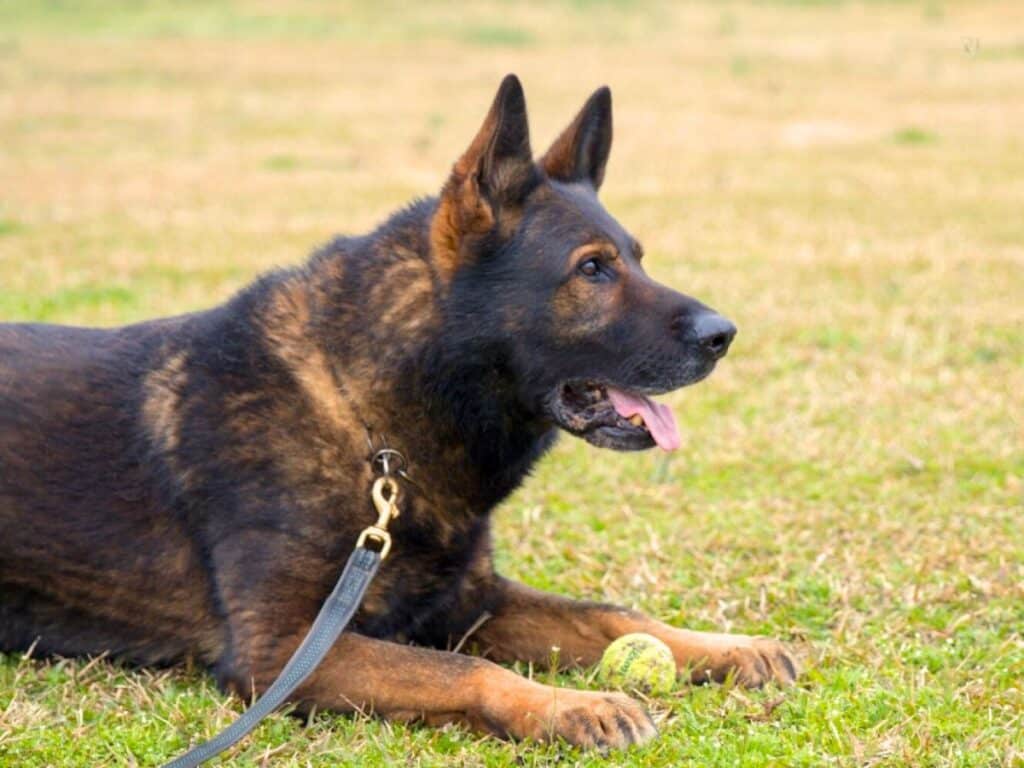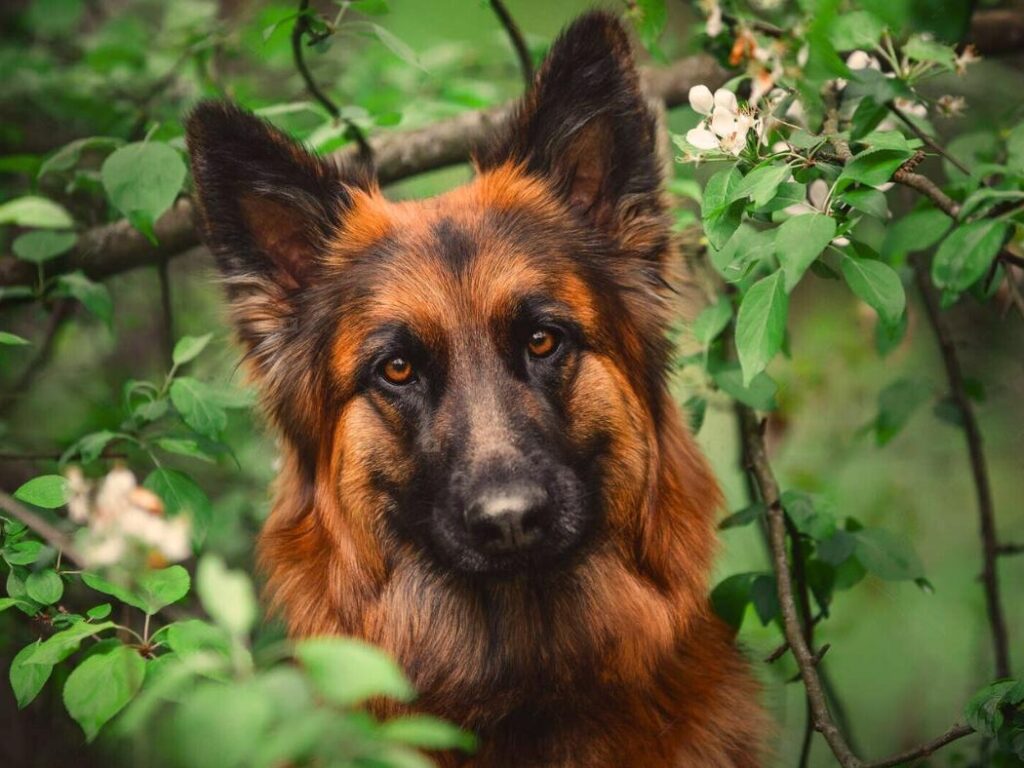Are you wondering how much should your German Shepherd sleep?
How long German Shepherds sleep depends on several factors such as age, health, and lifestyle.
In this article, you’ll learn:
- How much do German Shepherd puppies, adults, and senior dogs sleep?
- German Shepherd sleep patterns.
- How to make a German Shepherd sleep properly.

How Many Hours Does a German Shepherd Sleep?
It’s normal for a healthy adult German Shepherd to sleep 12-14 hours per day. If your dog is a puppy or a senior dog, it will likely sleep even longer. Sleep is essential for dogs to maintain their health and for puppies to grow.
German Shepherd dogs & puppies tend to sleep for chunks of time throughout the day and night and can be fairly flexible and adaptable with their sleep patterns.
Sleep is a vital component in your pup’s life, and it’s only natural to have concerns about our German Shepherd’s sleeping patterns, especially when they seem abnormal.
Just like babies, children, and teenagers all have different sleeping habits on their way to adulthood, GSDs too need varying amounts of sleep from puppyhood, adolescence, adulthood, and old age.
RELATED: German Shepherd Behavior Stages By Age: Puppy To Senior Years

German Shepherd Sleep Hours
The age of a German Shepherd is often the most significant factor that influences how much they sleep.
Here’s a table outlining how much a German Shepherd sleeps at different stages of their life:
| German Shepherd’s Age | Sleep Duration (hours/day) |
|---|---|
| 2 weeks | 18-20 |
| 1 month old | 18-20 |
| 2 month old | 14-18 |
| 3 month old | 14-16 |
| 4 month old | 14-16 |
| 5 month old | 14-16 |
| 6 month old | 12-16 |
| 6 months – 7 years old | 12-14 |
| 7+ years old | 16-18 |
Keep in mind that individual dogs may vary, and these are general guidelines. Additionally, the total hours of sleep can be distributed throughout the day and night.
German Shepherd Sleep Patterns
Sleeping all night had no advantage for dogs, so dogs did not evolve a natural tendency to sleep for a single long stretch of time like we do. Instead, they acquired the useful ability to get as much sleep as possible, often in short stretches, whenever there is nothing much going on.
You may have noticed that your GSD wakes up instantly and is ready for action right away. This ability evolved so that they could defend the pack from a threat at a moment’s notice.
German Shepherds have retained their ability to sleep whenever life gets dull. Studies of guard dogs have shown that dogs are not disadvantaged by being woken up frequently or working in changing shifts.
They simply sleep when they get the chance. But how many hours of sleep does a German Shepherd need in a 24-hour period?

How Long Do German Shepherd Puppies Sleep?
German Shepherd puppies often sleep between 18-20 hours a day. Puppies are undergoing major physical and mental growth, and sleep is important to ensure proper development.
A GSD puppy is a ball of energy when awake, and needs several hours of sleep after each play session.
When your new puppy is awake, it is burning a lot of energy, as they are always on the move!
They are also growing a lot during this time, which requires plenty of sleep. So don’t be concerned if your German Shepherd pup is sleeping a lot, it is perfectly normal at this stage of development.
Long naps might indicate that your puppy is having a growth spurt and needs the extra rest.
How Long Do Adolescent and Adult German Shepherds Sleep?
An adolescent German Shepherd usually sleeps between 12-14 hours a day, but this can go up to as much as 16 hours a day.
This can seem like a lot, but this is because their brains are going through a big reconstruction from puppy brain to adult dog brain.
While much of their physical growth has already happened, they’re still doing a lot of physical maturing, and that requires plenty of rest.
Adolescent GSDs who aren’t getting enough sleep can become rowdy, and engage in unwanted behaviors like barking, destruction, and tuning you out.

How Many Hours Does a Senior German Shepherd Dog Sleep?
On average, senior German Shepherds sleep 16-18 hours, but this can vary greatly depending on the individual dog and their temperament.
German Shepherds tend to live for 9 – 13 years and they are considered a senior dog at just 7 – 8 years of age, and senior dogs begin sleeping more often and longer.
You might not notice an increase in sleep right away, but as they get older, you’re likely to see an increase in how much they sleep.
RELATED:
German Shepherd Sleeping Too Much
There are several reasons why your German Shepherd might be sleeping more than usual. It’s important to note that variations in sleep patterns can be normal, and dogs, like humans, may sleep more in certain situations.
- If your German Shepherd has had an exceptionally active day, they may sleep more to recover and recharge.
- If there’s a sudden change in your dog’s sleep patterns, it could be a sign of an underlying health issue. Dogs often sleep more when they’re not feeling well.
- Dogs can be sensitive to changes in weather. Cold or rainy days may make your German Shepherd more inclined to nap.
- Dogs can become stressed or anxious for various reasons, and one coping mechanism is to sleep more.
- Poor nutrition or an inappropriate diet can affect energy levels and overall health, potentially leading to increased sleep.
- If your German Shepherd is sleeping more than usual, it could simply be because they find their sleeping spot comfortable and secure.
If your German Shepherd sleeps excessively for several days, it’s best to consult with a veterinarian. Conditions such as diabetes, hip dysplasia, arthritis, epilepsy, hypothyroidism, infections, and Lyme disease can contribute to increased sleep in German Shepherds.
RELATED: German Shepherd Common Health Problems

How To Make a German Shepherd Sleep Properly
Some German Shepherds are experts at putting themselves down for a nap when they feel tired.
Others seemingly never tire and are always ready for the next thing.
Here are a few ways to make your German Shepherd sleep properly:
Have a regular routine
Just like humans, dogs will benefit from having a regular daily routine. Having standard times of the day when you feed or walk your German Shepherd will help establish a rhythm to their day.
They will get a sense of when the most “exciting” parts of the day are, which will allow them to relax and sleep well in between.
Not having a routine will cause an excitable German Shepherd to remain on alert, so he doesn’t miss out on anything fun!
A routine will allow your dog to set up a sleep pattern they can count on. Something along the lines of “eat breakfast, explore the backyard, take a nap”.
Provide age-appropriate exercise to your dog
A German Shepherd who hasn’t had an opportunity to move their body may have a hard time settling down in the house, especially adolescent GSDs and puppies.
This is an active breed, so you’ll want to make sure you’re giving them plenty of outlets for exercise such as walking, hiking, swimming, and playing.
You don’t want to exercise your dog into a state of exhaustion, but you do want to satisfy their physical activity needs.
RELATED: German Shepherd Exercise Chart By Age

Provide them with ample mental stimulation
Equally as important as working out your dog’s body is working out their brain.
GSDs are highly intelligent, and if you only focus on physical exercise, they may struggle with getting enough sleep because of excess mental energy.
Some ways to incorporate mental exercise are puzzle toys and training games.
Some GSDs excel in dog sports such as agility, obedience, and nose work, and those can be excellent mental enrichment opportunities too.
Give them their own comfortable sleeping place
Having a comfortable place to sleep that they can call their own will go a long way towards having a well-rested dog. This is particularly true for puppies and older dogs.
A German Shepherd puppy will benefit from crate training, while an older dog will benefit from having a comfortable dog bed that is easy on his joints.
Crates can be great for puppies and teenage GSDs as well, who may not have the skill of putting themselves down for a nap quite yet.
Having the right sleeping arrangement for your German Shepherd will not only help your pup sleep better, chances are it will help you sleep better as well.
Feed them quality dog food at appropriate times
Just like in humans, nutrition can also play a role in sleep for dogs. A balanced diet contributes to overall health, including sleep quality.
If your pup isn’t getting their nutritional needs met, they might be restless throughout the day and night.
Be mindful of feeding times. Avoid large meals right before bedtime, but ensure your dog is not hungry.
RELATED: German Shepherd Feeding Chart By Age

FAQs
1. Do German Shepherd puppies sleep a lot?
Yes, German Shepherd puppies do sleep a lot, sometimes for 18-20 hours, especially during the early stages of their life. Puppies need plenty of sleep for proper growth and development.
2. Should German Shepherds sleep in a crate?
Crate training can be beneficial for German Shepherds, providing them with a secure space. However, it’s essential to ensure the crate is comfortable and associated with positive experiences.
3. Why does my German Shepherd sleep on his back?
Sleeping on their back is a vulnerable position for dogs, and if your German Shepherd does so, it could indicate a sense of trust and comfort in their environment.
4. Why does my German Shepherd sleep under my bed?
Seeking shelter under furniture may be a natural instinct for dogs. Your German Shepherd might feel secure and protected in this confined space.
5. Should I let my German Shepherd sleep in my bed?
Whether your German Shepherd sleeps in your bed is a personal choice. Some owners find it comforting, while others prefer separate sleeping spaces. It’s crucial to establish boundaries and train your dog accordingly.
6. How often do German Shepherds sleep?
German Shepherds, especially puppies and older dogs, require a significant amount of sleep. On average, they may sleep 12-18 hours a day, depending on their age and activity level.
7. Are German Shepherds light sleepers?
German Shepherds are known for being alert and vigilant, so they may not be very light sleepers. Their protective instincts can lead to them waking easily in response to potential stimuli.
8. Is it normal for a German Shepherd to sleep all day?
Yes, it is normal for German Shepherds, especially puppies and older individuals, to sleep a significant portion of the day. Puppies, in particular, require more sleep as they are growing and developing. Adult and senior German Shepherds may also sleep a considerable amount, especially if they are less active or have specific health conditions.
9. When can a German Shepherd sleep through the night?
German Shepherd puppies can start sleeping through the night when they are 3 – 4 months old. At around 3 months, some German Shepherd puppies may begin to have better bladder control, allowing them to sleep for longer periods without needing to go outside.
Summary
Understanding your German Shepherd’s sleep patterns and needs is crucial for their overall well-being. By considering factors such as age, health, exercise, and environment, you can ensure that your furry friend gets the quality rest they require. Recognizing unusual sleeping behaviors and making adjustments to their routine, diet, and surroundings can significantly impact their sleep quality.
Now that you have a better understanding of how to support your German Shepherd’s sleep, take the time to observe their habits and make any necessary changes to enhance their rest.
FURTHER READING:




